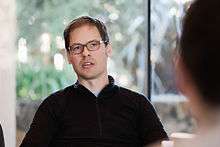D. Scott Phoenix
D. Scott Phoenix is an American entrepreneur and cofounder of Vicarious, an artificial intelligence research company.[1][2]
D. Scott Phoenix | |
|---|---|
 D. Scott Phoenix at Berggruen Institute event | |
| Born | June 10, 1982 |
| Nationality | American |
| Alma mater | University of Pennsylvania |
Career
In 2007, Phoenix graduated from the University of Pennsylvania with a Bachelor of Applied Science in Computer Science and Entrepreneurship.[3] After graduation, Phoenix started a company through the Y Combinator program,[4] and later joined venture capital firm Founders Fund as Entrepreneur in Residence.[5] In 2010, Phoenix co-founded Vicarious with neuroscientist and AI researcher Dileep George.[6][7] He is an advocate for the development of safe AI,[8][9] and a leading signatory on the Future of Life Institute's Open Letter on Artificial Intelligence.[10] In 2016, he predicted that by 2031 the fastest computing system would perform more operations per second than the number of neocortical neurons in all human brains alive at the time of the quote (on the order of 10^20 FLOPS, or 100 exaflops).[11]
Phoenix is interviewed in the 2018 AI documentary Do You Trust This Computer?
See also
References
- Waters, Richard. "Investor rush to artificial intelligence is real deal". Financial Times. Retrieved 6 Nov 2015.
- "The Next Big Thing You Missed: The Quest to Give Computers the Power of Imagination". Wired Magazine.
- Scott Phoenix bio Archived 2015-11-24 at the Wayback Machine at Vicarious (company)
- Kincaid, Jason. "Frogmetrics: Handheld Surveys You Might Actually Want To Fill Out". TechCrunch. Retrieved 6 Nov 2015.
- "D. Scott Phoenix Executive Profile and Bio". Bloomberg.
- Ha, Anthony. "Early Facebook Executives Back AI Startup Vicarious Systems". New York Times. Retrieved 4 December 2013.
- "Zuckerberg, Musk Invest in Artificial-Intelligence Company". Wall Street Journal.
- "Bill Gates Fears A.I., but A.I. Researchers Know Better". Popular Science.
- "How artificial intelligence is getting even smarter". World Economic Forum. 14 August 2015. Retrieved 6 Nov 2015.
- Hern, Alex (12 January 2015). "Experts including Elon Musk call for research to avoid AI 'pitfalls'". The Guardian. Retrieved 24 April 2015.
- Knight, Will. "Meet the secretive AI startup that's trying to give computers imagination". MIT Technology Review. Retrieved 2018-03-28.